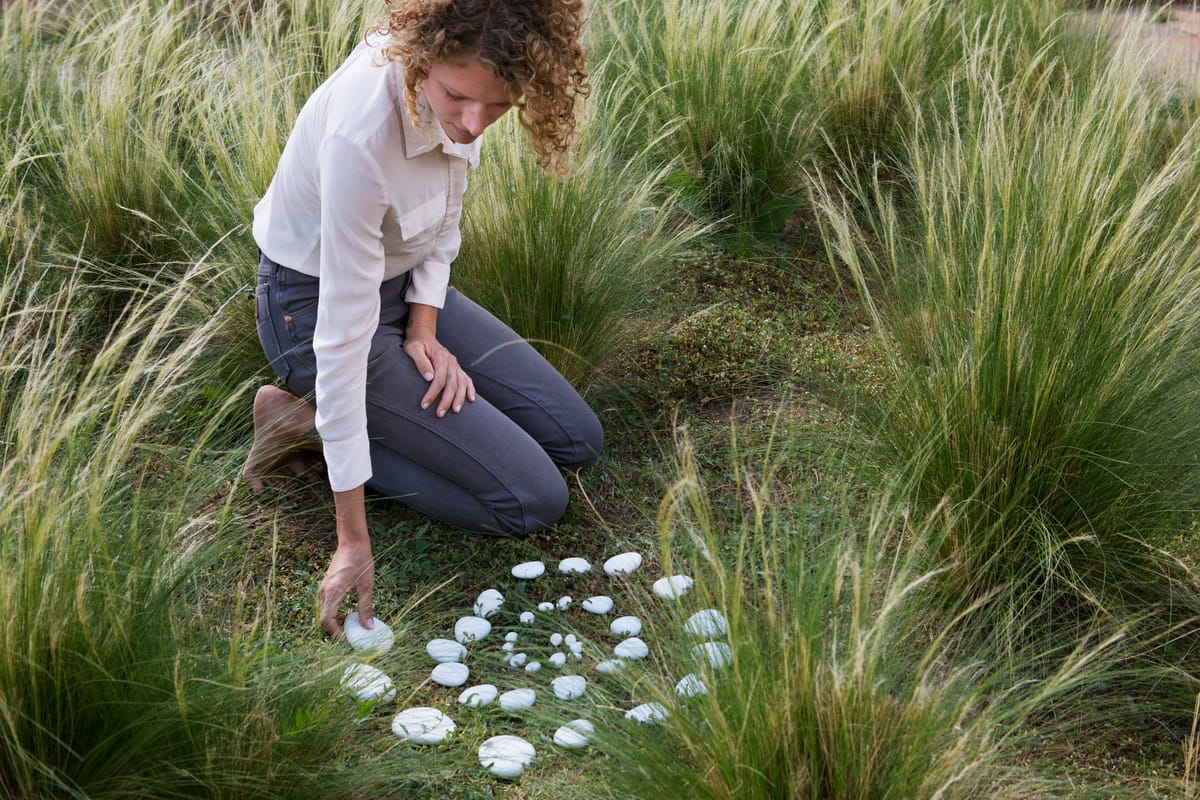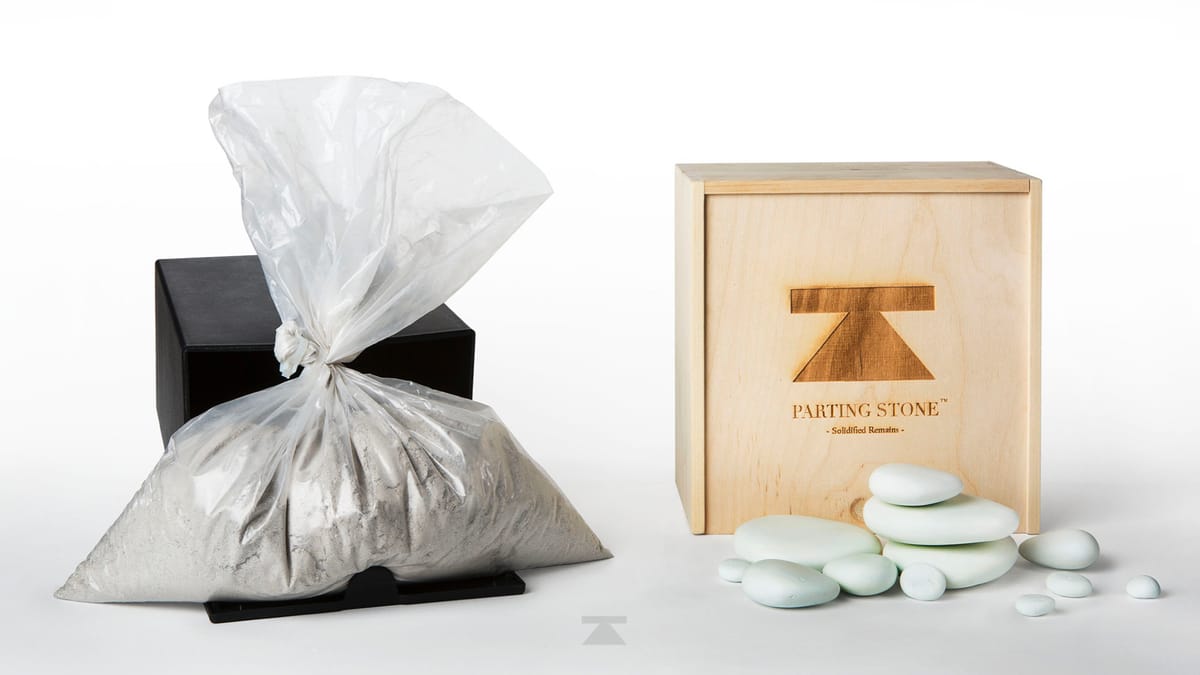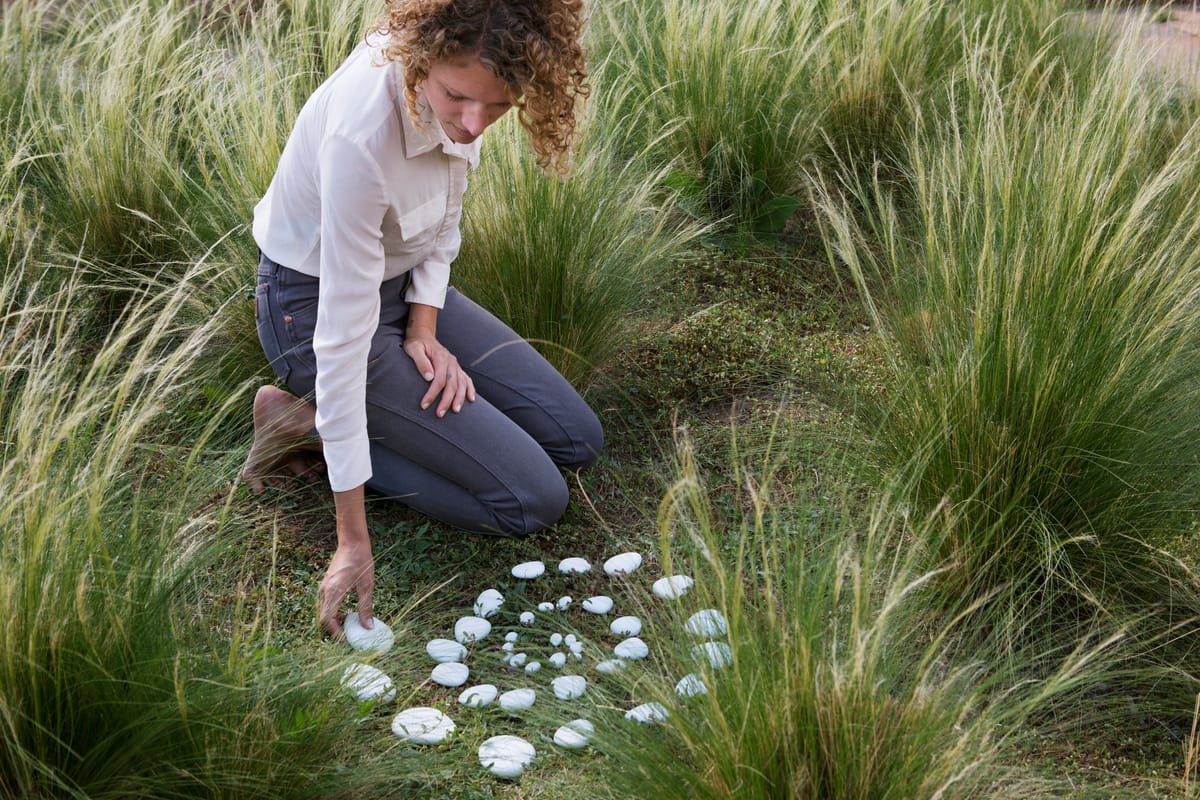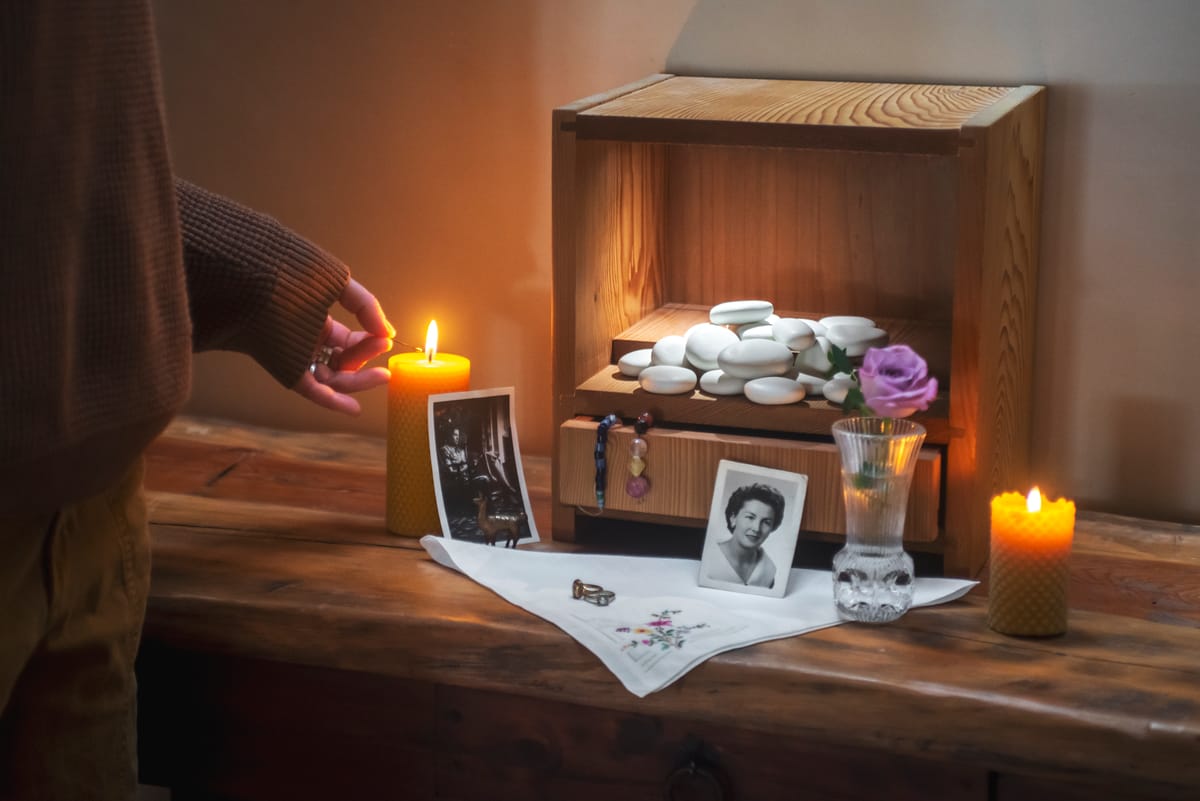Memorial Options That Travel: Comparing Portability
Compare portable memorial options for travel. Find memorials you can take anywhere to feel close to your loved one on journeys, from ashes to solidified remains.

Planning your first trip after loss often surfaces an unexpected question: How do you bring your loved one along without risking complications at airport security? Traditional urns often feel too fragile and conspicuous, and may pose potential problems during TSA screening. You're not ready to leave them behind, but you're also unsure what portable memorial options will work for your actual travel style.
If you're navigating these questions, you're not alone in wanting to maintain connection during travel and life experiences. The best memorial options for travel include solidified remains (which pass through security like ordinary stones), memorial jewelry (compact but limited in capacity), and adequately documented cremation ashes (which require certificates and may trigger additional screening). Each option offers distinct benefits in terms of portability, durability, and ease of transport.
This guide compares portable memorial options specifically for travelers, addressing both the practical logistics and the emotional considerations of bringing your loved one's memory into new experiences.
Key Takeaways
- Portable memorial options include solidified remains, memorial jewelry, traditional ashes, keepsake containers, and digital memorials, each with distinct travel advantages.
- Solidified remains offer TSA compliance and durability advantages over traditional cremation ashes, which require documentation and face security screening challenges.
- International travel with memorials involves varying regulations, with solidified remains bypassing most customs complications that ash transport encounters.
- The best portable memorial for you depends on your travel frequency, destination types, and how you're finding connection during this stage of grief.
- You can combine multiple memorial options, keeping some at home while traveling with others to maintain flexibility.
Reflections on love, loss, and the ways we carry them.
In grief work, I’ve learned that remembrance doesn’t end where the journey begins. Many families tell me they want their loved ones to “come along” and continue to be part of the new memories they continue to make. But traveling with cremated remains often brings unexpected anxiety. The fear of spilling, losing, or explaining the ashes at airport security can make what should be a comforting gesture feel tense and overwhelming.
One client, a woman who traveled often for work, carried her husband’s ashes in a small urn inside her briefcase. She confessed that every TSA line felt like “a test of strength.” When I introduced her to solidified remains, her relief was palpable. She now keeps one stone in her pocket whenever she travels, and another sits on her desk at home. “It’s like he’s with me,” she told me, “but in a way that feels peaceful, not fragile.”
That’s the quiet power of solidified remains. They’re durable, discreet, and travel easily, passing through airport checks as naturally as pebbles in a pocket. More importantly, they allow families to continue journeys of love and memory without fear.
Grief changes form, and so can remembrance. Sometimes healing means realizing we don’t have to leave our loved ones behind; we simply carry them forward—solid, tangible, and ever-present in our unfolding story.
Cathy Sanchez Babao
Parting Stone Grief Coach
Understanding Your Portable Memorial Needs
Travel represents continuation. It's where you're building new memories while honoring existing ones, and many people find that having a physical memorial present creates a sense of companionship during these experiences.
The desire to travel with a memorial isn't about being unable to let go; it's about honoring a loved one. It's about integration, about finding ways to include your loved one in the ongoing story of your family's life. Whether you're visiting places they loved, introducing them to new destinations, or simply wanting their presence during meaningful moments, portability becomes a practical concern that warrants attention.
Your travel patterns matter here. Frequent fliers face different considerations than road trippers. International travelers encounter regulations that domestic travelers often overlook. And adventure-focused families need durability that museum-visiting families might not prioritize. Understanding these distinctions helps you identify which portable memorials truly align with your lifestyle.

Comparing Portable Memorial Options
Traditional Cremation Ashes
Cremation ashes remain the most common form of remains, but they present specific travel challenges that many people don't anticipate until they're standing in a security line.
Physical Portability: Ashes require containment in sealed vessels, typically urns or temporary containers. The TSA allows cremated remains through checkpoints, but only in containers that can be screened by X-ray. This means no metal urns, which will trigger a manual inspection that TSA agents are prohibited from conducting. You'll need to use materials like wood, plastic, or ceramic that X-rays can penetrate.
Travel Considerations: For domestic air travel, you'll want to carry ashes in your carry-on luggage, never in checked bags, where they could be lost. TSA recommends bringing a copy of the death certificate or cremation certificate. Some agents may request additional screening, and while they cannot open the container, this can create emotionally difficult moments at security.
International Travel: Different countries impose varying requirements. Many require official documentation, including certified death certificates, cremation certificates, and, in some cases, consular approval. Some nations restrict ash transport entirely. Research destination-specific regulations well in advance of travel, as obtaining proper documentation can take several weeks.
Durability Factors: Ashes themselves are delicate and prone to scattering if containers open accidentally. Moisture can cause clumping. Temperature changes don't affect the ashes, but containers may crack or degrade depending on the material.
Emotional Connection: Many people find that the tangible weight of the container provides a sense of reassurance. The act of carrying ashes creates a sense of responsibility and closeness that feels meaningful during travel.
Memorial Jewelry
Memorial jewelry offers a discreet option for traveling with a physical remembrance, although capacity limitations mean it works best as a supplementary choice rather than a primary memorial.
Physical Portability: Jewelry pieces (pendants, rings, bracelets) are inherently portable, fitting easily in carry-on bags or worn directly on your body. Most designs hold only a small amount of material, approximately a pinch of ashes or a single small stone.
Travel Considerations: Jewelry poses no concerns for the TSA and can be taken internationally without documentation. You'll want to consider insurance for valuable pieces, particularly those with precious metals or gemstones.
Durability Factors: Quality matters significantly. Well-sealed jewelry with screw-tight closures protects contents during travel. Lower-quality pieces may leak or open unexpectedly. Metal settings prove more durable than resin or glass for active travel.
Emotional Connection: Wearing your loved one close to your heart throughout a journey creates a constant connection. The intimacy of jewelry appeals to many people, although its small capacity means it typically supplements rather than replaces other memorial forms.
Cost Considerations: Memorial jewelry ranges from $50 for basic pendants to several thousand dollars for custom-designed pieces with precious materials.

Solidified Remains
Solidified remains (like those created through Parting Stone's process) transform cremated ashes into smooth, stone-like pieces that address many traditional travel challenges.
Physical Portability: The solidification process creates multiple individual stones, each about the size of a skipping stone. You can travel with one, several, or all of them, depending on your preference. Their appearance resembles river rocks, making them naturally discreet. The division into multiple pieces allows you to keep some at home while traveling with others, offering flexibility that single containers cannot provide.
Travel Considerations: These pass through TSA screening like any other stones. They don't trigger special procedures, don't require documentation for domestic travel, and security personnel typically don't give them a second glance. For international travel, they bypass the cremation ash regulations entirely, as they're not classified as cremated remains by most customs authorities.
Durability Factors: Solidified remains are remarkably durable. They don't leak, break, or degrade from temperature changes or moisture. You can carry them in pockets, bags, or luggage without protective containers. They're suitable for outdoor activities, including hiking, beach trips, and water sports, where traditional urns would be impractical.
Emotional Connection: Many people find that the tactile nature of stones provides comfort during travel. You can hold them during takeoff, carry them in your pocket during hikes, or place them in hotel rooms to create a sense of presence. The ability to divide stones among family members means multiple people can travel with their own pieces.
Cost Considerations: The solidification service costs $2,495 for human remains and $1,195 for pet remains, representing a one-time investment that eliminates future travel complications.

Keepsake Containers
Small keepsake containers allow you to travel with a portion of ashes while keeping the majority at home or in a permanent memorial location.
Physical Portability: Keepsake containers range from tiny vials to small urns, typically holding between a teaspoon and a cup of ashes. Their compact size makes them more manageable for travel than full-sized urns.
Travel Considerations: These face the exact TSA requirements as full urns (X-ray scannable materials, carry-on only, potential documentation requests). Their smaller size sometimes draws less attention, but regulations remain identical.
Durability Factors: Quality varies widely. Metal keepsakes may not be TSA-compliant, while glass versions risk breaking. Secure closures are crucial in preventing spills during travel.
Emotional Connection: Keepsakes offer a middle ground between bringing all remains and bringing none, which appeals to people who want a connection without the responsibility of transporting everything.
Cost Considerations: Keepsake containers range from $20 to $300, depending on the materials and craftsmanship used.
Digital and Photo Memorials
Digital memorials eliminate physical transport concerns, though they lack the tangible connection that many people seek during travel.
Physical Portability: Digital memorials can be stored on phones, tablets, or cloud storage, adding no weight or space to luggage. Photo books or printed images require minimal space.
Travel Considerations: No TSA, customs, or documentation concerns exist. Digital files travel instantaneously across borders.
Durability Factors: Digital files don't physically degrade, though device damage or technical issues can temporarily limit access. Physical photos may wear from handling or environmental exposure.
Emotional Connection: For some people, photos are sufficient for maintaining a connection during travel. Others feel they lack the tangible presence that physical memorials provide. This varies significantly by individual preference.
Travel-Specific Considerations
Domestic Air Travel Requirements
The TSA permits cremated remains to pass through security checkpoints, subject to specific guidelines that create varying experiences for travelers.
Containers must be made of materials that X-ray machines can penetrate. This eliminates most metal urns, which cannot be opened by security personnel even if screening is inconclusive. Wooden, plastic, or ceramic containers are the best options. Carrying remains in your carry-on bag rather than checked luggage protects against loss, as airlines cannot compensate for lost cremated remains.
Bring documentation, including death certificates and cremation certificates, even though TSA doesn't always request them. Having paperwork available prevents complications if questions arise. Arrive at the airport with extra time, as additional security screening may be in place.
Keep in mind that security screening often occurs in public view. If you're concerned about privacy or find the process emotionally difficult, traveling during off-peak hours may reduce stress.
International Travel Documentation
International travel involves complex regulations that vary significantly by country, necessitating research tailored to your destination.
Many countries require official documentation to be translated into the local language and, in some cases, notarized or apostilled. Death certificates, cremation certificates, and transit permits may all be necessary. Some nations require advance permission from consulates or embassies before allowing remains entry.
Certain countries prohibit ash transport entirely or restrict it to specific entry points. Others allow cremated remains, but not through certain airlines or shipping methods. Research requirements 2-3 months before travel, as obtaining proper documentation often takes longer than anticipated.
Solidified remains typically bypass these complications entirely, as most customs authorities don't classify them as cremated remains, eliminating the documentation requirements that ash transport demands.
Ground Transportation and Road Trips
Road trips offer the most straightforward option for traveling with memorials, as no security screening or documentation typically applies.
You control the entire journey, allowing you to secure memorials as carefully as desired. Temperature-controlled vehicles protect materials sensitive to heat or cold. You can make spontaneous stops at meaningful locations without the time constraints that air travel imposes.
For multi-day road trips, consider how you'll secure memorials overnight. Hotel rooms generally work fine, though some people prefer keeping memorials with them rather than leaving them unattended.
Outdoor Activities and Adventure Travel
Active travel creates unique durability demands that rule out fragile memorial options.
Hiking, camping, water sports, and similar activities require materials that can withstand jostling, potential drops, and exposure to the elements. Traditional urns rarely survive these conditions intact. Jewelry works if appropriately secured, though losing small pieces during vigorous activity remains a risk.
Solidified remains excel in outdoor contexts. Their stone-like durability means you can carry them during strenuous activities without protective cases. Many people bring individual stones on specific adventures, creating a practice of including their loved ones in meaningful experiences.

Making Your Decision
Choosing the proper portable memorial depends on your specific travel patterns, comfort with various regulations, and how you're finding connection during this time.
| Memorial Type | TSA Compliance | International Ease | Durability | Capacity | Approximate Cost |
|---|---|---|---|---|---|
| Traditional Ashes | Requires documentation | Complex regulations | Fragile | Full remains | Container cost ($50-$500) |
| Memorial Jewelry | Excellent | Excellent | Moderate to High | Minimal | $50-$3,000+ |
| Solidified Remains | Excellent | Excellent | Excellent | Full remains (divisible) | $2,495 (human) / $1,195 (pet) |
| Keepsake Containers | Requires documentation | Complex regulations | Varies | Partial remains | $20-$300 |
| Digital/Photo | N/A | N/A | Digital: high / Physical: moderate | N/A | Minimal |
Ask yourself these questions when evaluating options:
- How frequently do you travel, and where do your trips typically take you?
- Do you prefer to have all your belongings with you, or are you comfortable traveling with a portion?
- How vital is discretion during security screening and public travel?
- What level of durability do your activities require?
- Do you anticipate international travel where documentation becomes complicated?
- Would you prefer a memorial you can hold and touch, or is visual remembrance sufficient?
There's no single correct answer here. Your choice reflects your unique relationship with your loved one and the ways you're creating an ongoing connection. Some families use multiple approaches, keeping traditional urns at home while traveling with jewelry or solidified remains. Others consolidate into a single portable option that fits their lifestyle completely.
The goal is finding what brings you peace and allows you to include your loved one in your life's experiences without creating additional stress during already emotional times.

Frequently Asked Questions
Can I bring cremation ashes on an airplane?
Yes, you can bring cremation ashes on airplanes in your carry-on luggage. The TSA requires that containers be made of X-ray scannable materials like wood, plastic, or ceramic (not metal). Bring documentation including death and cremation certificates. Never pack ashes in checked luggage, as they cannot be replaced if lost.
What documentation do I need for international travel with ashes?
Documentation requirements vary by country but typically include a certified death certificate, cremation certificate, and sometimes consular approval. Many countries require documents translated into the local language and notarized or apostilled. Contact the embassy of your destination country at least 2-3 months before travel to confirm specific requirements.
Are solidified remains easier to travel with than ashes?
Yes, solidified remains are generally easier to travel with than traditional ashes. They pass through TSA security without special documentation, don't trigger additional screening, and bypass most international cremation regulations. Their durability also eliminates concerns about container breakage or spills during travel.
Can I take memorial jewelry through airport security?
Yes, memorial jewelry passes through airport security without any special requirements or documentation. You can wear it or pack it in carry-on or checked luggage. Memorial jewelry doesn't trigger TSA concerns and travels internationally without restrictions that apply to cremated ashes.
What happens if TSA needs to inspect cremated remains?
If a container cannot be screened by X-ray (such as metal urns), TSA agents cannot open it for inspection. This means metal containers will be denied through security checkpoints. If you use an approved scannable container and questions arise, agents may request documentation but cannot open the container itself.
How do I choose between keeping ashes at home or traveling with them?
This decision is deeply personal and depends on your relationship with your loved one, your travel patterns, and what brings you comfort. Some people find peace in keeping ashes in a permanent location while traveling with jewelry or photos. Others prefer having physical remains present during trips. You can also use keepsake containers to bring a portion while leaving the majority at home, or choose solidified remains that divide into multiple pieces for flexibility.









